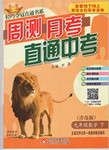题目内容
He turned off the lights and then ________ the classroom.
- A.leaves
- B.will leave
- C.is leaving
- D.left
解析:
此题考查动词的时态。句意是“他关掉灯并离开了教室。”“关灯”与“离开教室”都是主语发出的动作,一起作并列谓语,两个动词的时态应一致。

 轻巧夺冠周测月考直通中考系列答案
轻巧夺冠周测月考直通中考系列答案I was being interviewed by a senior manager for a major insurance(保险业)company. I told him honestly why I wanted the job —I needed to keep my family in Boston. My wife recently died of a heart attack. A job in Boston would help me reduce some of the extreme trauma(精神创伤) and pain of the loss for my 16-year-old daughter. It was important for me to keep her in her present high school. I could still hardly talk about the loss of my wife. Bruce, the interviewer, was politely empathetic, but he didn’t probe(彻底调查) any further. He admitted (接受)my loss and, with great respect, moved on to another subject. After the next round of the interview, Bruce took me to lunch with another manager. Then he asked me to take a walk with him. He told me that he, too, had lost his wife. And, like me, he had also been married 20 years and had three children. In his sharing, I realized that he had experienced the same pain as I had —a pain that was almost impossible to explain to someone who had not lost a beloved one. He offered his business card and home phone number and suggested that, if I need help or just want someone to talk to, I should feel free to give him a call. Whether I got the job or not, he wanted me to know that he was there if I ever needed help. When he had no idea if we would ever see each other again, he helped our family deal with one of the greatest losses. He turned the normally cold business interview into a caring support for another person in need.
【小题1】The author took part in the interview because _______.
| A.he had lost his job and wanted to find a new one |
| B.he had to support his family in Boston |
| C.his wife had recently died of a heart attack |
| D.his daughter needed money for schooling |
| A.kind | B.easy-going | C.smart | D.understanding |
| A.Bruce invited the author to lunch later. |
| B.Bruce shared his life experience with the author. |
| C.Bruce was willing to help the author. |
| D.Bruce finally gave the job to the author. |
| A.Bruce and the author saw each other often |
| B.the author got little help from Bruce |
| C.the author learned much from the job interview |
| D.the author had a better life afterwards |
| A.An act of kindness |
| B.A pleasant interview |
| C.The same experience |
| D.An important lesson |
There is one word you must learn before you visit the USA. That is “Freeze”. Remember it has a special meaning besides the usual one. It means “stand still and don’t move”. Often policemen use it when they are ready to use their guns. If one doesn’t obey the order and moves, he or she will be shot to death.
One evening in Los Angeles, someone rang the bell of a house. It was a dangerous area at night, so the owner of the house took his gun with him when he answered the door. He opened the door and saw a strange man. But the man turned round and started walking away from the house. The owner cried: “Freeze”, but the young man went on walking without obeying the owner’s order. The owner thought he was trying to run away, so he shot at the young man and he was killed.
Later, police found that the dead man was a Japanese student who was studying in Los Angeles University. He went to visit a friend, but unluckily could not remember the number of the house. When he realized he went to the wrong house he turned round and left. He didn’t know much English and so didn’t understand the word “Freeze”. What a lesson we should get for this!
【小题1】According to the article, what does the word “Freeze” mean?
| A.It means “be covered with ice”. | B.It means “very cold”. |
| C.It means “dangerous”. | D.It means “Stand still, or I will shoot you”. |
| A.a policeman | B.a man with a gun |
| C.a person who possesses something | D.a dog of a house |
| A.When you hear the police or someone say “Freeze” in the USA, you must stop moving. |
| B.Don’t ring the bell of anyone’s house in the USA at night. |
| C.At last, the police found the dead man was a thief. |
| D.The owner of the house was put into prison. |
| A.Police say “Freeze” when they are going to use their guns. |
| B.The story happened in Los Angeles in the morning. |
| C.The dead man was a Japanese student. |
| D.The dead man couldn’t understand the meaning of “Freeze”. |
| A.A Japanese Student | B.American Police |
| C.Freeze | D.The Owner of a House |